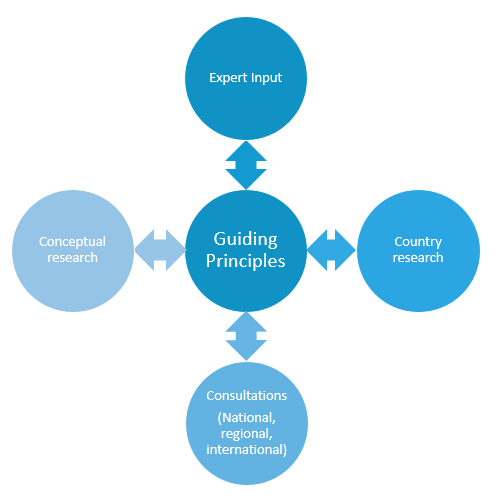Overview
The Abidjan Principles were developed using international human rights legal standards and jurisprudence, with inputs from stakeholders from various backgrounds — human rights lawyers, education specialists and practitioners, and various communities — and geographic regions. Specific efforts were made to reach out to communities and rights-holders affected by education policies, in particular by the growth of private actors in education.
The Abidjan Principles emerged out of a need to respond to the rapid growth of various forms of private involvement in education in the last 20 years which, if left unchecked, could gravely impair the progress made in the realisation of the right to education. UN and other regional human rights bodies, UN Special Rapporteurs, courts, and other human rights institutions have increasingly addressed the issue in the last years. This has led to the development of a myriad of legal sources, which needed to be compiled in a single text to clarify the applicable legal standards. This is what the Abidjan Principles encompasses.
Process
The Abidjan Principles were developed through an open, transparent, and broadly consultative process that included a variety of perspectives and reflected multiple contextual realities.
From 2016 to 2018, a series of regional, national, and thematic consultations were convened around the world, concluding with an adoption conference in Abidjan, Côte d’Ivoire by a group of experts in February 2019. A secretariat made up of Amnesty International, the Equal Education Law Centre, the Global Initiative for Economic, Social, and Cultural Rights, the Initiative for Social and Economic Rights, and the Right to Education Initiative facilitated the consultative process.
In addition to the public consultations, the Abidjan Principles were informed by specific inputs from:
1) conceptual research and empirical research from a human rights perspective, and
2) expert inputs from a constituency of experts from various backgrounds.
Experts in Law, human rights and education developed 10 papers that informed the development of the Abidjan Principles in a book titled, “Realizing the Abidjan Principles on the Right to Education: Human Rights, Public Education, and the Role of Private Actors in Education”. It mixes cutting-edge legal and social research papers, providing a multidisciplinary analysis on some of the most critical issues in contemporary education discussions, from public-private partnerships to the right to public education.
The book provides an insight into the richness of the reflections that led to the adoption of the Abidjan Principles. The background papers produced for the development of the guiding principles are:
Developing human rights guiding principles on State obligations regarding private education (Sylvain Aubry, Mireille de Koning, and Frank Adamson);
Human rights guiding principles: a forward-looking retrospective (Magdalena Sepúlveda Carmona);
Is there a right to public education? (Jacqueline Mowbray);
Parental rights in education under international law: nature and scope (Roman Zinigrad);
State funding of private education: the role of human rights (Sandra Fredman);
Evidence on school choice and the human right to education (Joanna Härmä);
How and why policy design matters: understanding the diverging effects of public–private partnerships in education (Antoni Verger, Mauro C. Moschetti, and Clara Fontdevila);
The growth of private actors in education in East Africa (Linda Oduor-Noah);
The evolution and forms of education privatisation within francophone countries (Marie-France Lange); and,
Strengthening the implementation of the Abidjan Principles (Frank Adamson, Delphine Dorsi, and Magdalena Sepúlveda Carmona)
The book is edited by Frank Adamson, Sylvain Aubry, Mireille de Koning and Delphine Dorsi, and published by Edward Elgar Publishing in NORRAG’s series on International Education and Development.
The book is now available for free, click the button to download



